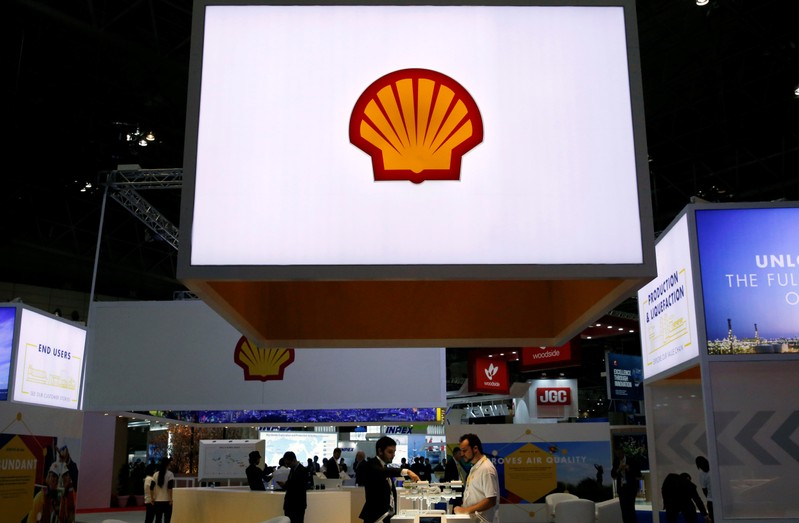
FILE PHOTO: Staff members work at the booth of Royal Dutch Shell at Gastech, the world’s biggest expo for the gas industry, in Chiba, Japan, April 4, 2017. REUTERS/Toru Hanai
January 31, 2019
By Ron Bousso
LONDON (Reuters) – Royal Dutch Shell vowed to stick to spending discipline this year even as 2018 profits jumped by more than a third to their highest since 2014 at $21.4 billion.
The Anglo-Dutch oil company also reported a sharp rise in cash generation, in a further sign that cost savings since the 2014 oil market downturn are filtering into its operations.
Its shares were up 3.7 percent in early trading.
A strong performance in the fourth quarter was driven by higher oil and gas prices, year-on-year, as well as a stronger contribution from crude oil and liquefied natural gas trading.
“The cash flow is incredible,” said Rob West, analyst at Redburn. “It’s heavily flattered by downstream inventory liquidation, but it still squashes any lingering worries about debt and dividend coverage.”
“The debate will move to long-run growth now … My view is that Shell could create a lot of value for investors by upping investment and returning to growth mode,” he said. Redburn has a “neutral” rating on Shell shares.
The world’s top oil companies are expected to have generated more cash in 2018 than at any other time this decade after years of cuts, but boards remain cautious amid uncertainty over oil prices.
Investors saw large gains in energy shares in the first nine months of 2018 that were largely wiped out in the final quarter as oil prices collapsed from a four-year high of $86 to $50 a barrel within weeks. Oil prices have hovered near $60 a barrel so far this year.
Concerns over global economic growth amid a Sino-U.S. trade war further weighed on global shares.
But Shell’s strong results are set to raise confidence in the company’s strategy of boosting cash generation by focusing on high margin businesses such as deepwater oil and liquefied natural gas.
“We delivered on our promises for the year, including the completion of the $30 billion divestment program and starting up key growth projects while maintaining discipline on capital investment,” CEO Ben van Beurden said in a statement.
“We will continue with a strong delivery focus in 2019, with a disciplined approach to capital investment and growing both our cash flow and returns.”
Shell is the first oil major to report 2018 results. U.S. rivals Exxon Mobil and Chevron publish results on Friday.
GRAPHIC: Shell 2018 results – https://tmsnrt.rs/2TpvZdm
GRAPHIC: Shell Q4 2018 profits – https://tmsnrt.rs/2TnxDfL
PROFITS SOAR
Shell’s 2018 profits jumped 36 percent to $21.4 billion, beating the $20.98 billion in a company-provided forecast and boosted by a strong second half performance.
In the fourth quarter, net income attributable to shareholders, based on a current cost of supplies (CCS) and excluding identified items, rose 32 percent to $5.69 billion as cost cuts filtered through. That topped a company-provided forecast of $5.28 billion.
Oil and gas production in the year rose slightly to 3.666 million barrels of oil equivalent per day as new fields that came online offset the effect of disposals.
Shell’s cash flow from operations in the fourth quarter rose to $22 billion, boosted by a $9 billion working capital movement, which brought the annual figure to $53 billion.
Free cash flow – cash available to pay for dividends and share buybacks – rose to $39.4 billion from $27.6 billion in 2017.
Shell, the world’s biggest dividend payer at $16 billion a year, started last October a three-year $25 billion share buyback program promised following the acquisition of BG Group in 2016.
Shell had acquired around $4.5 billion of shares by the end of January. On Thursday, it launched the next tranche of $2.5 billion until the end of April, it said.
It largely completed by the end of 2018 a three-year, $30 billion asset disposal program to pay for the $54 billion BG Group acquisition. The assets included large portfolios in the North Sea, Norway and Canada that led to a decline in Shell’s oil and gas production.
Capital investment reached $24.8 billion for the year, slightly below the lower end of Shell’s guidance.
(Reporting by Ron Bousso; Editing by Jason Neely and Mark Potter)

